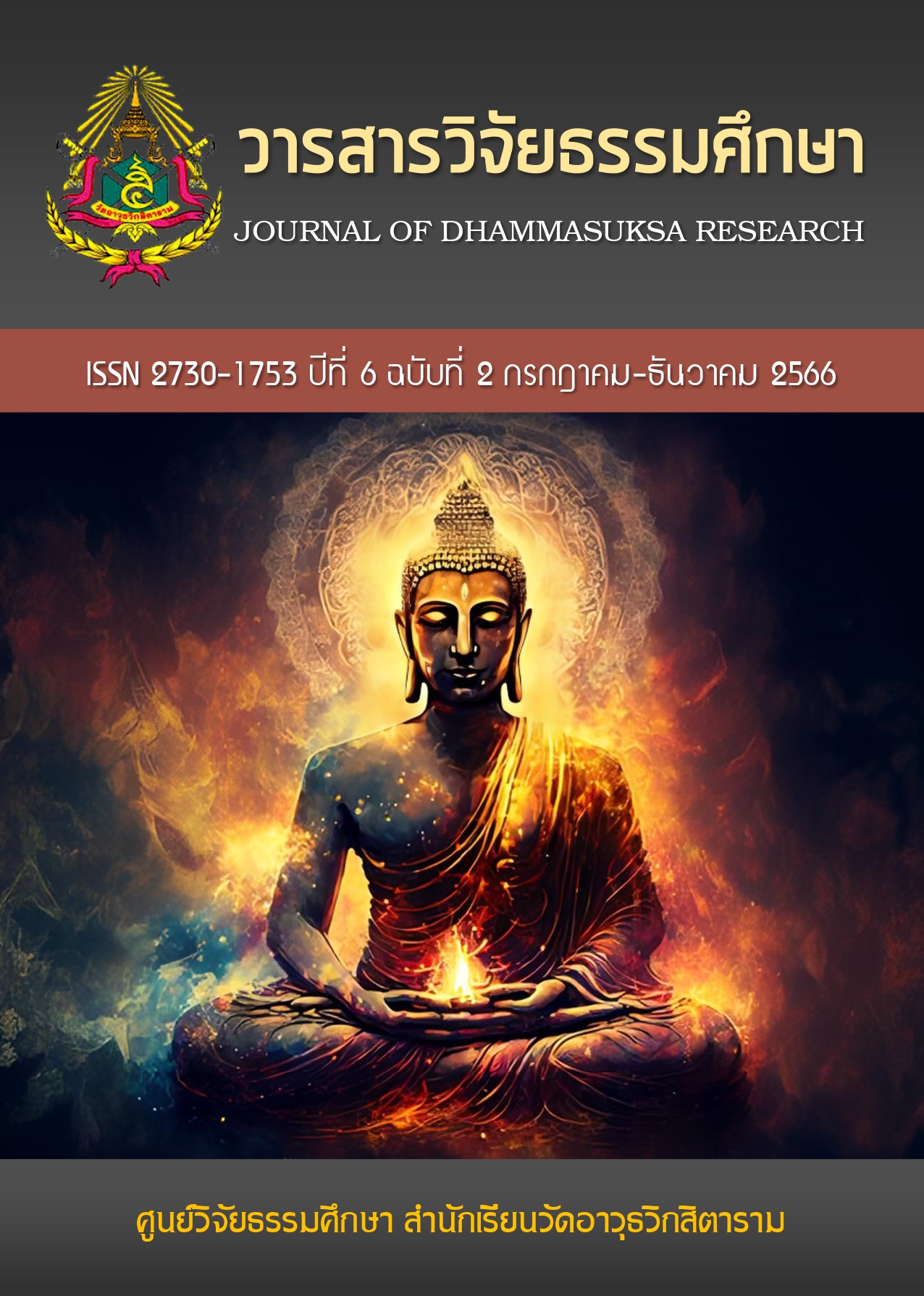สินน้ำใจกับการเลือนความหมาย
คำสำคัญ:
สินน้ำใจ, การเลือนความหมาย, คอร์รัปชั่นบทคัดย่อ
การวิจัยนี้มีวัตถุประสงค์เพื่อวิเคราะห์ความหมายของคำว่า “สินน้ำใจ” และการเลือนความหมายโดยใช้การวิธีวิเคราะห์ปรัชญา ผลการวิจัยพบว่า สินน้ำใจมาจากคำว่าสินและน้ำใจ ซึ่งมีภววิทยาของน้ำใจบนความสัมพันธ์ของการรู้จักกันและการมีกิจเกี่ยวข้องกัน และมีสินน้ำใจเป็นการตอบแทนน้ำใจซึ่งแบ่งเป็นสินน้ำใจสีขาวและสินน้ำใจสีดำ และได้ถูกเลือนความหมายเป็นสินบนตามภววิทยาของผลประโยชน์ที่เข้ามาเกี่ยวข้อง แต่เมื่อสินบนนั้นเป็นคำที่ได้แสดงคุณค่าในเชิงลบไปเสียแล้ว สินน้ำใจก็ถูกเลือนความหมายจนเกิดความเข้าใจในระดับเดียวกับสินบนนั่นคือ เป็นรากเหง้าของการคอร์รัปชั่น การวิจัยนี้เสนอว่า เมื่อความหมายของคำถูกเลือนไปในทางที่ลบก็ควรคืนความหมายเดิมของคำๆ นี้นั้นด้วยการชี้แจงความหมายเดิมเพื่อรักษาความหมายของคำให้ตรงกับสภาพหรือสภาวะของคำ “สินน้ำใจ” มีขอบเขตความหมายแท้ที่ใช่หรือไม่ใช่อย่างชัดเจน ส่วนใดที่ไม่ใช่ความหมายแท้และทำให้ความหมายเดิมเสียไปก็ใช้วิธีนิรนัยคือ ตัดส่วนที่ผิดเพี้ยนออกไปทีละส่วนๆ เพื่อให้เหลือแต่ส่วนที่ตรงกับความหมายแท้เพื่อให้เห็นคุณค่าของคำวา “สินน้ำใจ” บนพื้นฐานของน้ำใสใจจริงอันเป็นความ “ดีงาม” แบบไทยแท้ และเห็นภัยที่เกิดขึ้นจากการเลือนความหมายหรือทำลายความหมายที่ดีแต่เดิมให้เสียไปที่เกิดในสังคมไทย
เอกสารอ้างอิง
Bos, J. (2020). Research ethics for students in the social sciences, https://doi.org/10.1007/
-3-030-48415-6_8.
จักรี ศรีจารุเมธีญาณ. (2561). นโยบายต่อต้านคอร์รัปชั่นและการให้สินบน. วารสารสถาบันวิจัยและพัฒนา มหาวิทยาลัยราชภัฎมหาสารคาม, 5(2), 301-310.
จิรัฐพร ไทยงูเหลือม, พิมพ์พจี บรรจงปรุง, อารีย์ ศรีอำนวย, วิมาน วรรณคำ. (2561). วัฒนธรรมและการใช้ภาษาเกี่ยวกับการทุจริตคอร์รัปชันในบริบทสังคมที่ปรากฎในวรรณกรรมไทยและการใช้จริงในปัจจุบันของภาคประชาสังคมจังหวัดนครราชสีมา. วิวิธวรรณสาร, 2(3), 53-69.
ปิ่นแก้ว เหลืองอร่ามศรี. (2565). ส่วย สินบน การรีดไถ: พื้นที่สีเทาในความสัมพันธ์ระหว่างรัฐ ทุนและแรงงานข้ามชาติ. สังคมศาสตร์, 34(1), 14-44.
พจนา มาโนช, กีรติ บุญเจือ, เอนก สุวรรณบัณฑิต, สิริกร อมฤตวาริน. (2563). มรดกเชิงพลวัตรผ่านกระบวนทรรศน์ 5 กับการแก้ไขทุจริต: การศึกษาเชิงวิเคราะห์ วิจักษ์และวิธาน. วารสารสันติศึกษาปริทรรศน์ มจร, 8(1), 247-256.
พระครูโอภาสสราธิคุณ (ชาตรี อาสโภ), สิริกร อมฤตวาริน, กีรติ บุญเจือ, เอนก สุวรรณบัณฑิต. (2564).
พุทธธรรมาภิบาลกับปรัชญาหลังนวยุคสายกลาง. วารสารสันติศึกษาปริทรรศน์ มจร, 9(4),
-1454.
พระสุพรม สุนฺทโร (นาโม), พระครูสุธีคัมภีรญาณ, อดุลย์ หลานวงศ์. (2565). เฮือน 3 น้ำ 4 ที่มีผลต่อการดำเนินชีวิตของชุมชนตำบลยางท่าแจ้ง อำเภอโกสุมพิสัย จังหวัดมหาสารคาม. Journal of Modern Learning Development. 7(9): 25-37.
สัญยาศรณ์ สวัสดิ์ไธสง. (2564). มุมมองต่อระบบอุปถัมภ์กับระบอบประชาธิปไตยในสังคมไทย. วารสารวิทยาการจัดการ มหาวิทยาลัยราชภัฎสกลนคร, 1(2), 1-18.
สิริกร อมฤตวาริน, กีรติ บุญเจือ. (2558). ปรัชญาเศรษฐกิจพอเพียงกับความสุขแท้ตามความเป็นจริง. วารสารบัณฑิตศึกษา มหาวิทยาลัยราชภัฎสวนสุนันทา, 2(6), 259-266.
อิมรอน ซาเหาะ, ยาสมิน ซัตตาร์, อับดุลเอาว์วัล สิดิ. (2565). ริชวะฮ์กับการเลือกตั้ง: จากหลักอิสลามสู่ปรากฎการณ์ในสังคมมลายูมุสลิมชายแดนใต้. วารสารวาระการเมืองและสังคม, 1(1), 39-56.
เอนก สุวรรณบัณฑิต. (2564). ความรู้และสันติภาพ (e-book). กรุงเทพฯ: ปิสเปส.
ดาวน์โหลด
เผยแพร่แล้ว
รูปแบบการอ้างอิง
ฉบับ
ประเภทบทความ
หมวดหมู่
สัญญาอนุญาต
ลิขสิทธิ์ (c) 2023 วารสารวิจัยธรรมศึกษา

อนุญาตภายใต้เงื่อนไข Creative Commons Attribution-NonCommercial-NoDerivatives 4.0 International License.



